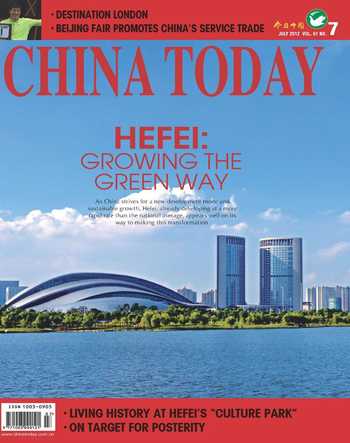LETTERS
Some Chinese people, for no particular
reason, look down on indigenous architecture. But the Pritzker choice proves that the Chinese can design buildings that are every bit as innovative and creative as
those by Western architects. I always believe there are Eastern sensibilities that Western architects will never be able to capture, and vice versa. The fresh feel of Wang Shus
work should be an inspiration for Chinese architects. Contextual architecture calls for architects to be native to the place. I hope that I will see more impressive buildings in China designed by our architects.
Zeng Wenhui Hubei Province, China
As an overseas Chinese, I particularly
enjoy reading the articles on Chinese culture, both ancient and modern, and so do my children, who were born and raised in the U.S. Cultural Custodians is a chance for my children and I to discover the fascinating Chinese craftsmanship and their inheritors. Not only we Chinese, but also many of the Americans I know, have an enormous interest in this topic. The protection of cultural successors is one of the most important aspects of cultural survival. The last thing we would do is stand by and watch our precious cultural treasures disappear in this era of fast development. In my opinion, cultural custodians in China also need to engage in more exchanges and communication with their overseas counterparts so that they can bring their outstanding crafts to the world and work with them to solve the current difficulties that they face.
Liu Xiaohui The USA
Four years ago, on May 12, 2008, the
Wenchuan Earthquake hit. Having lived through a number of earthquakes in Cali-
fornia and having spent years as a volunteer trying to help bring some semblance of
normalcy to the lives of many people in the aftermath of the 1989 Loma Prieta Earth
quake in California, I knew firsthand the
long term impact that such an event could
have. On May 13, 2008 I wrote the song,
Earthquake Earthquake, as a memorial to
both those who lost their lives and those
who survived. The majority of the lyrics
came quickly but I could not finish it as the death toll continued to mount. The key point I sought to make in this memorial song is
the response of the Chinese people, both in the immediately affected area and across
the country, to it, despite the potentially
overwhelming effects of this disaster. This
was best expressed in the chorus, with the
words, “You will not drive us to defeat, the peoples spirit you will not beat,” and in the final verse: “People did what they had to do to work despite their grief.” With this spirit, there is no problem that cant be overcome.
Mark Levine Beijing, China
Nowadays, we cannot fail to notice that along with striking economic growth,
which is also sometimes referred to has
“hard power,” China is well on the way to
increasing her part as an attention grabber.
But, simultaneously, we shouldnt turn a
blind eye to the enormous space that”soft
power” calls forits growth. There are many
doubts about what the driving force for the
“soft power” should be. Nevertheless, I be
lieve deeply that the key lies in supporting
cultural productions and expanding inter
national cultural influence. Kungfu, Peking
Opera and pandas are what first come to
mind when people think of China. But as
undoubtedly one of the oldest and the most
dazzling civilizations on earth, Chinese
culture boasts much more than those three
elements. However, many misunderstandings and stereotypes have led to Chinas
image becoming a threat. China still has a
long way to go to improve its “soft power” to display China as a peaceful rising power and win greater rights to have its voice heard
in the international arena. However, I have never been more hopeful than I am today
that we Chinese will get there.
Shi Li
Sichuan Province, China
Children left in the countryside when
their parents migrate to find work are facing more growing pains, in material and psychological terms, than their urban counterparts. At the most delicate period of life when personality is shaped, these children are left behind with aged grandparents or other relatives. The tenuous bond between child and parent is sustained by telephone calls, which in extreme cases occur just
twice a year. The perennial lack of parental supervision and discipline may result in many troubled youths in the countryside. But it is hard for those of us living in cities to blame their parents. The root of this phenomenon is the huge economic development gap between rural and urban areas. If farming could provide ample income or if there were ample employment in the countryside, few parents would choose to move to cities.
Zhang Han Tianjin, China

